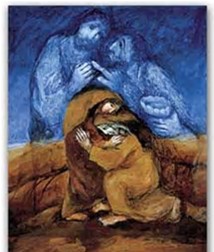On Wednesday Evenings during Lent we often use the service of Evening Prayer. Interestingly the Canticle for that service is the Magnificat. For some it seems strange that we would use a Christmas song during Lent. We miss the great images that come from this song of thanksgiving
My soul magnifies the Lord
And my spirit rejoices in God my Savior;
Because He has regarded the lowliness of His handmaid;
For behold, henceforth all generations shall call me blessed;
Because He who is mighty has done great things for me,
and holy is His name;
And His mercy is from generation to generation
on those who fear Him.
He has shown might with His arm,
He has scattered the proud in the conceit of their heart.
He has put down the mighty from their thrones,
and has exalted the lowly.
He has filled the hungry with good things,
and the rich He has sent away empty.
He has given help to Israel, his servant, mindful of His mercy
Even as he spoke to our fathers, to Abraham and to his posterity forever.
Martin Luther wrote a meditation on the Magnificat for Prince John Frederick who would become the ruler of Saxony. He thought it had something to say to political leaders, but more importantly it tells us something about God and his dealing with us.
“The Magnificat taught Luther that a Christian does not place his trust in God’s gifts; he trusts in His grace, in God Himself.” Perverted lovers of God, the parasites, hirelings, and slaves, love salvation but not their Savior.’~ They “seek their own advantage in God, neither love nor praise His bare goodness, but have an eye to themselves and consider only how good God is to them.”When He hides His face and withdraws the rays of goodness, love cools promptly. They seem to be unable to love the bare, unfelt goodness hidden in God. Contrary to this spirit the Christians, the truly lowly, naked, hungry, and God fearing – like the Virgin Mary – love God Himself, not only the good things of God. The hirelings, thinks Luther, would let God’s good things go unloved and unpraised if heaven and hell did not exist. Such men are actually trying to make a lackey out of God. They surely will not obtain a reward; God is not their Savior; they have fabricated a savior for themselves.” (Heino O. Kadai, “Luther’s Theology of the Cross” Concordia Theological Quarterly Vol 63:3 July 199 page 169″


